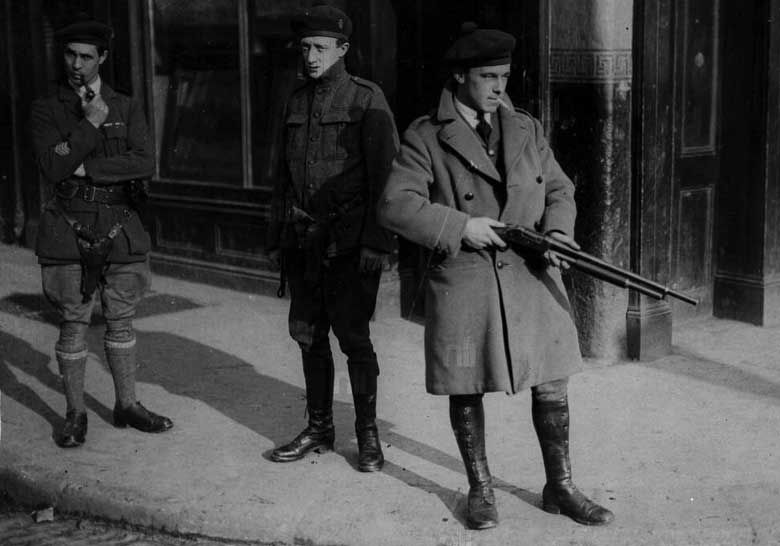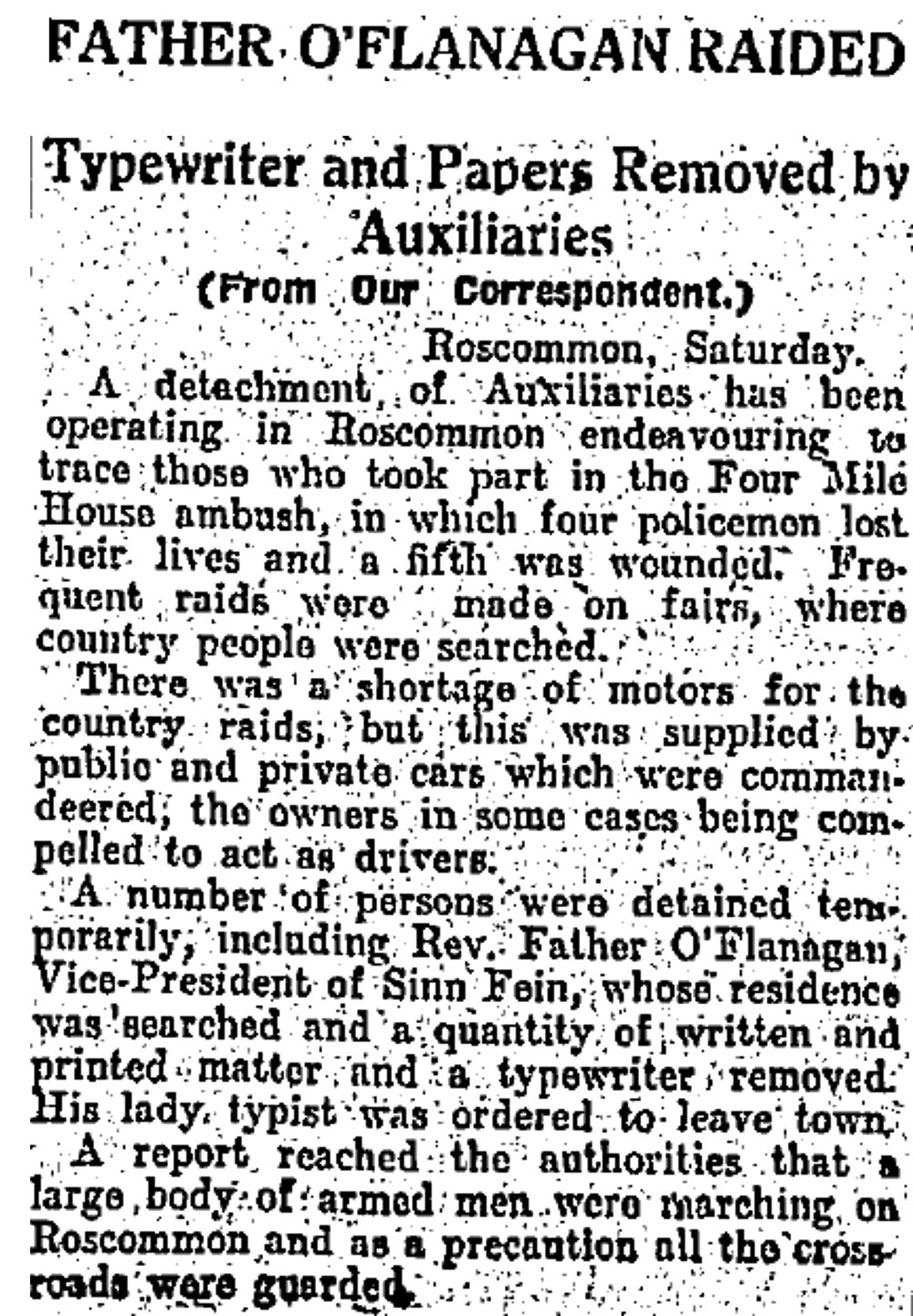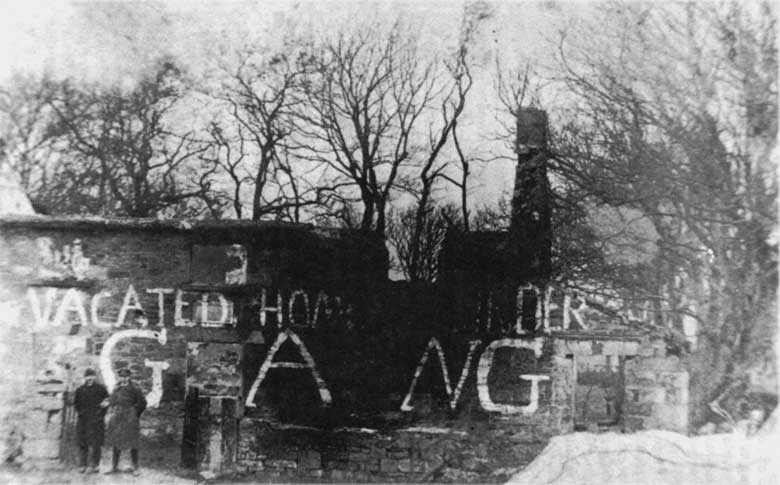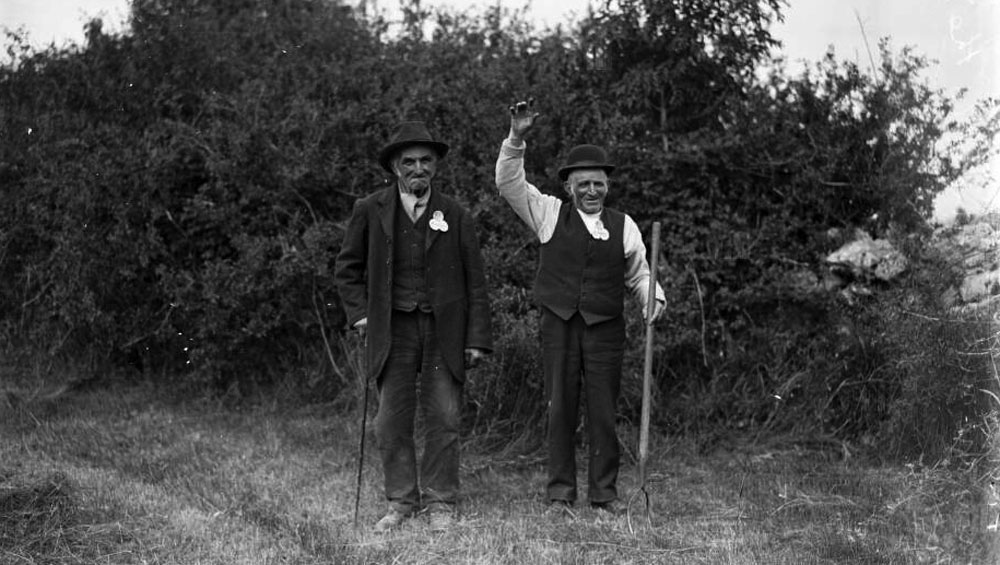Raid on Father O'Flanagan's house.
Fr. Michael's efforts to establish some kind of moves towards a peace settlement in December of 1920 caused uproar among his peers, who were swift to denounce him. However, a look at wider events and some newly discovered papers give us an idea of what was going through Fr. Michael's mind when he initiated his series of letters to Lloyd George.Vera McDonnell, a Sinn Féin stenographer who worked as a typist for Fr. Michael, was witness to the raid on his rooms in Roscommon presbytery on Friday October 22nd 1920, which prompted him to place his papers in Lough Glynn Convent for safe-keeping.
The door of the Curates' house was opened by Fr. Carney, the other curate, and the Auxiliaries proceeded to search Fr. O'Flanagan's rooms. They pulled the place asunder and read all his letters.
Fr. O'Flanagan was interested in the derivation of Irish place names and, for that reason, he used to buy old Ordnance survey maps at auctions. He had shortly before bought some belonging to the County Surveyor who had died and pieces of these had been cut out apparently by the Surveyor for his own purpose.
The Auxiliaries came to the conclusion that Fr. O'Flanagan had cut them out for the I.R.A. for the purpose of attacks on the Crown forces. They told me if they got Fr. O'Flanagan they would give him the same fate as they had given to Fr. Griffin.
They also told me to leave the town at once, and that my being a woman would not save me from being put up against a wall and shot. During all this time Fr. Carney remained in his own rooms and was not molested.
Vera McDonnell, B.M.H. W.S. - 1,050

Raid on Father O'Flanagan's house.
A raid by two Auxiliary officers accompanied by two R.I.C. Sergants was carried out on the home of Father O'Flanagan. The two R.I.C. sergants were sent to ensure that the Auxilaries would not take away any private porperty.
Father O'Flanagan's typist was put under arrest by the Auxilaries and ordered to leave the town in so many hours, and her typewriter seized. During the search the two Auxilaries found a £5 note in a jug on a shelf, which they collected. The two sergants there and then objected, but their objection was overruled by the Auxilary officers.
As they were about to leave they saw a suitcase. They could not open it, so they got a knife and ripped it open. The case contained vestments belonging to the priest. The sergants again objected to the cutting of the suitcase, but without effect.
They suggested that the case should be taken to the barracks and held there when it could be opened in the presence of Father O'Flanagan. On opening the case they cut the vestments to pieces.
When Father O'Flanagan returned to his home that night and saw the depredation that had been done, and missed the £5 note from the jug, he became very annoyed. He came up to the Co. Inspector to complain about the matter, but got no satisfaction from him.
Later he saw the colonel in charge of the military, but got less satisfaction there. He told them that he would go further with the matter and have an enquiry opened. The Auxilaries, on hearing this, made arrangements to have Father O'Flanagan taken away and probably shot.
This came to my knowledge and I rushed down to Father O'Flanagan immediately and asked him to leave his house as soon as possible and that if he stayed in the town not to stay in any house the second night, but to leave town at the earliest opportunity. He took my advice and went to the College in Sligo.

During his time there he prepared a file of everything that had transpired during the raid on his house. He got this away to America and Dr. McDonnell told me that the contents of the file were posted on the doorway of the British Consul's office in America and other public places.
As a matter of fact it got so much publicity in this manner that the British Consul communicated with the Home Consul to know if it was true. He communicated with the British Government, who knew nothing about it.
They, the British Government, communicated with Dublin Castle and, as the latter knew nothing about it, they sent a convoy of twelve lorry loads of British military down to the Co. Inspector's office in Roscommon, bringing down the dispatch that came from the British Consul in America and asking for a report on the matter.
I can't remember what Co. Inspector's reply was, but he sealed it next morning and sent it to the officer in charge of the convoy to have it taken back to Dublin Castle.
That night, with the aid of my skeleton key, I gained access to the Co. Inspector's office and got hold of the file of correspondence dealing with the raid. I copied the complete contents of this file.
From this time I knew that an inquiry was about to take place, but as I did not know what the two R.I.C. sergants were prepared to say, I invited them to a local public house for a drink and when they were sufficiently refreshed I discreetly introduced the matter of the raid.
I asked them how they were going to act and they said they were looking forward to the day when they could swear to the truth of the Auxiliaries taking the £5 note and cutting up the vestments.
I left the original file back in the Co. Inspector's office and handed the file of copied documents to Doctor McDonnell who, in turn, passed the file on to Michael Collins and the latter got the file sent to America where the copied documents were again used as propaganda and posted on the British Consul's doorway together with the original poster about the raid.
John Duffy, member of R.I.C. Athlone, and Kiltoon, Co. Roscommon 1916 - 1921.

The country was at boiling point during the autumn of 1920; on Monday October 25th Terence MacSwiney, Lord Mayor of Cork died after a 74 day hunger-strike and at Moneygold near Ahamlish cemetry an I.R.A ambush killed four of the nine men on patrol from Cliffoney R.I.C. Barracks.
Reprisals came swiftly to Cliffoney with a series of savage raids by the Auxiliaries who visited several nights of terror upon the people of north Sligo.
The R.I.C. County Inspector reported:
Weekly Telegraph, November 6th, 1920."The houses of some leading suspects were burned as well as the Father O'Flanagan Sinn Féin Hall at Cliffoney."
" Andrew Conway's brother was a constable who resigned. The house was burned at five o'clock in the morning, and the ex-policeman escaped in his night-shirt. A good deal of the crops has been burned in both places. The Father O'Flanagan Hall is in ruins; the Ballintrillick Creamery is burned, and portion of the Grange Temperance Hall, including the library is also burned."

